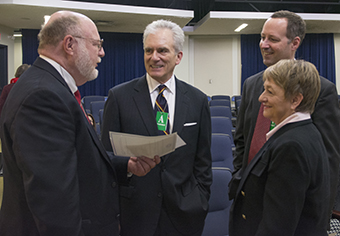By Bob Allen
The Obama administration announced a new initiative to fight religious discrimination in communities at a White House forum Dec. 17 about upholding America’s tradition of religious pluralism.
Vanita Gupta, head of the Civil Rights Division of the Department of Justice, said in coming months her office will partner with other federal agencies to host a series of community roundtables and discussions in a new administration-wide, community-engagement initiative to ensure the nation’s promise of religious freedom for all.
“Combating discrimination based on one’s religion remains fundamental not only to protecting our values but also to defending our freedom,” said Gupta, an assistant attorney general who previously worked for the American Civil Liberties Union. “We cannot — and we must not — allow our enemies to define how we live or to dictate how we treat one another.”
 The announcement came during a gathering of leaders from a broad array of religious groups, NGOs and federal agencies — including moderate Baptists — celebrating traditions of religious inclusion, freedom and cooperation among Americans with different beliefs.
The announcement came during a gathering of leaders from a broad array of religious groups, NGOs and federal agencies — including moderate Baptists — celebrating traditions of religious inclusion, freedom and cooperation among Americans with different beliefs.
“Let’s be very clear: There are no second-class faiths in the United States of America,” Melissa Rogers, director of the White House Office of Faith-based and Neighborhood Partnerships, told the gathering.
“If we’re honest, we will admit that we have not always lived up to our ideals,” said Rogers, an attorney who previously worked at the Baptist Joint Committee for Religious Liberty. “Our history is pock-marked by periods when the majority has chosen exclusion of people such as Catholics or Jews for example. So we’ve chosen exclusion sometimes over pluralism.”
“There’s growing concern today that we could be entering into another such period, telling certain people that simply because of their faith they cannot be part of our pluralism,” Rogers said. “Nothing could be more un-American. Nothing could strike more fundamentally at our founding principles.”
The White House event included a panel introducing Know Your Neighbor, an initiative by 15 diverse organizations including the Baptist Joint Committee to promote understanding and respect between Americans of different faiths and those who have no faith at all.
BJC Executive Director Brent Walker, who for more than a quarter century has battled in the nation’s capital in the “vertical fight of making sure that government remains neutral towards religion,” said it’s also important to “pay attention to that horizontal relationship” of getting to know neighbors.
“It’s not just that vertical relationship between church and state, but also horizontally and culturally and interpersonally how we relate to one another,” Walker said. Both, he said, are “essential components to preserving our plush religious pluralism in this country and the freedoms that we all enjoy.”
Robert Jones, CEO of Public Religion Research Institute, briefed the audience on demographics fueling tensions driven by religious pluralism.
“At no time in our nation’s history have we really experienced this level of diversity, and the most dramatic of these changes have occurred across the generations that are currently alive today,” Jones said. “That’s a lot of change in a short amount of time. To be sure, these changes will present some challenges, and at our worst I think we are seeing that they may ignite fear or even violence.”
At the same time, Jones said, today’s generation faces a new opportunity “to engage in the ongoing work of living out the words on the Great Seal of the United States, E pluribus unum, out of the many, one.”
The Know Your Neighbor website contains testimonials from Roy Medley, general secretary of the American Baptist Churches USA, about what he learned in years of Baptist/Muslim dialogue; Mary Elizabeth Hanchey, a Baptist student at Duke Divinity School who befriended a Muslim woman while their newborns battled for life in a hospital neo-natal unit; and George Mason, pastor of Wilshire Baptist Church in Dallas about his church’s unexpected encounter with Ebola.
Walker applauded such stories as “concrete examples of how we get it right sometimes.”
Previous story:
